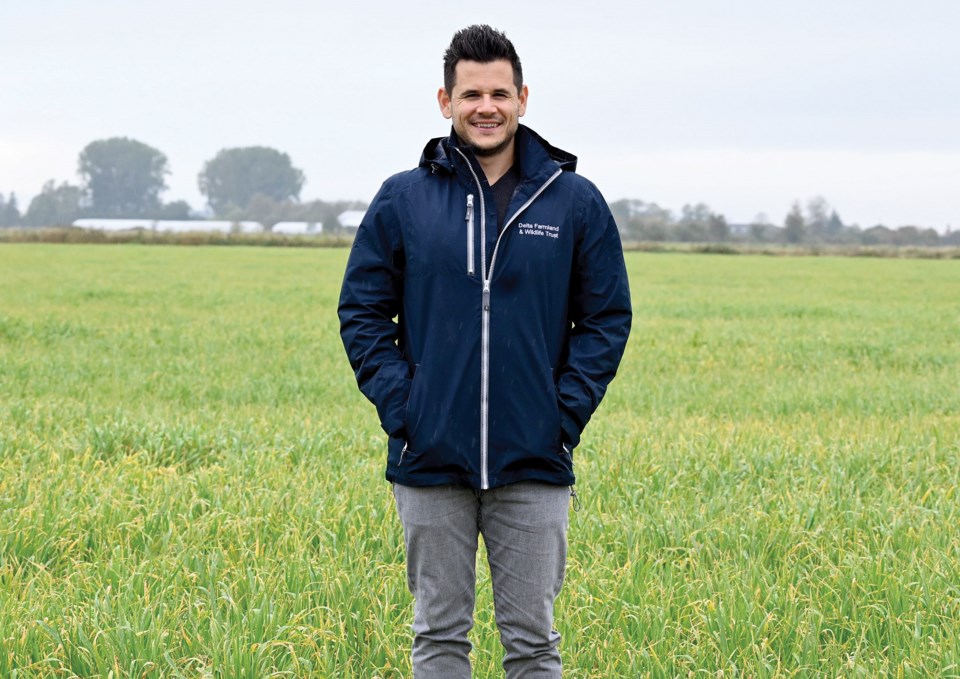It has benefitted wildlife while at the same time assisted the Delta farming community.
Established in the early 1990s by local farmers and conservationists to conserve agricultural and wildlife resources within the Fraser River delta, the Delta Farmland and Wildlife Trust promotes the preservation of farmland and associated wildlife habitat through sustainable farming and land stewardship, one of the few programs of its kind in the country.
The Trust administers stewardship programs that are made available to local farmers.
Under these programs, the DFWT shares the cost of management practices contributing to soil and/or wildlife habitat conservation and enhancement.
The Trust also continues to refine its programs through ongoing research to ensure the maximum possible benefit for both the farming community and wildlife.
“We’ve been very fortunate this year. All our funding has come in, although a lot of it was in the works prior to COVID-19. Our Day at the Farm event, unfortunately, had to be cancelled and this would have been our 15th year. Other than that, we’ve been able to go ahead with all our programs and research,” said program director Drew Bondar.
The DFWT’s annual funding report notes that for the 2019/20 fiscal year, Delta funds, combined with other funding sources, facilitated the planting of approximately 1,018 hectares (2,516 acres) of winter cover crops, approximately 180.5 hectares (446 acres) of grassland set-asides and approximately 198 hectares (489 acres) of forage enhancement lands.
The winter cover crop program aims to supply critical habitat to large numbers of over-wintering waterfowl.
Grassland set-asides, fields that have been temporary removed from production and seeded, contribute to soil conservation by improving soils for farming while at the same time providing wildlife habitat.
The Forage Enhancement Program assists forage producers with the increasing intensity of waterfowl grazing that their forage fields experience over the winter season.
Annual monitoring and evaluation, as well as extensive research, provide evidence in support of continuing both the winter cover crop and grassland set-aside programs.
It’s important, though, that cost-share rates with farmers are at a level sufficient to promote enrollment, the report notes.
Last year, the Trust increased its rate for grassland set-asides, noting interest in the last couple of years had been waning as it became apparent the cost share was no longer sufficient to justify participation.
A cost-benefit analysis of DFWT stewardship programs was done this summer, while surveys were also completed to identify concerns and challenges that growers are finding with the stewardship programs.
“We did increase the cost-share rate last year from $300-to-$400 an acre but we’re going to have to watch and see how that has an impact over the next couple of years on enrollment. This year, it was challenging to hit our (grassland set-aside) 500 acre target. The shrinking land base and the increase in costs makes it more and more challenging to take land out of production and set it aside,” said Bondar.
“In terms of what an appropriate cost share rate would be to provide enough incentive, that’s still a question we’re looking at. The $300-an-acre is what we initially started at over 25 years ago.”
Bondar also noted the winter cover crop rate last year also increased, from $55-to-$65, but that’s just a portion of what it costs farmers to plant a cover crop.
He said the level of grazing by waterfowl in Delta is reaching higher levels that make it even more challenging to justify the cost when an entire field is grazed clean.
The Trust, meanwhile, has various other research projects on the go, some in conjunction with post-secondary institutes including UBC and BCIT.
A multi-year survey that started this year, in partnership with UBC and funded by the Investment Agriculture Foundation of B.C., will find out what type of beneficial insects are in various fields.
The plan next year is to partner with blueberry growers to establish pollinator set-asides.
Editor's note: Be sure to pick up your copy of the People to Know in the Oct. 29th print edition of the Optimist.



